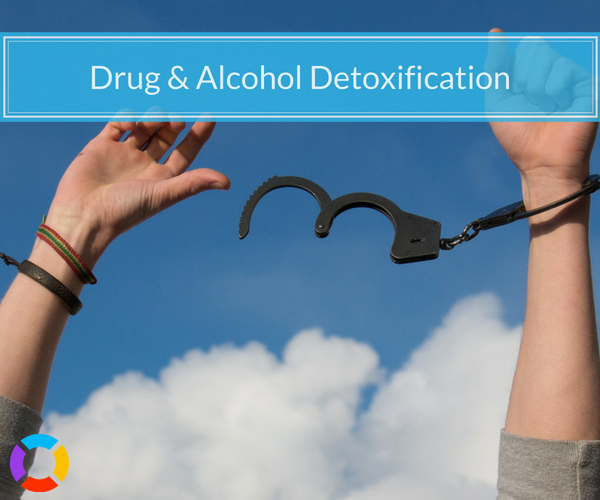Detox Treatment for Addiction: What to Expect and Where to Start

Maybe you’ve heard the term “detox” but aren’t sure exactly what that means. Or maybe you or your loved one needs detox treatment for addiction, but you aren’t sure where to turn. Use this comprehensive guide to addiction treatment detox to get started.
Call now to speak with someone about detox. Help is available.
What is Detox Treatment for Addiction?
Addiction detox treatment utilizes a set of interventions designed to safely manage acute drug or alcohol withdrawal. It includes treatments to remove drug or alcohol toxins from the body while minimizing the physical and psychological discomforts associated with withdrawal.
Addiction detox is the first step in the addiction recovery process. Full and lasting recovery often requires follow-up treatment at an inpatient or outpatient treatment facility, plus aftercare and social support from family and peers.
Inpatient detox treatment is recommended when addiction is severe, when there is risk for self-harm, or when additional physical or mental health issues are present that require access to 24/7 medical care. Outpatient detox treatment allows you to manage work and other responsibilities while you are in treatment.
What Happens During Detox Treatment?
The detoxification process varies depending on the severity of addiction, the kinds of substances involved, and the duration of the addictive behavior. The detox process can last from several days to several months depending on these variables.
Detox is an important first step in recovery. Detox helps manage physical dependence and stabilizes you physically and mentally. It readies you to receive and benefit from follow-up counseling.
Detox treatment centers provide intake and assessment, diagnosis, medication management, and interventions involving behavioral therapies and a variety of counseling techniques, as well as mental and emotional skills training and social support.
Inpatient detox provides 24-hour care in a hospital or facility with a controlled environment and intensive treatment from doctors, nurses, and counselors.
Outpatient detox can occur in a physician or counselor’s office, a clinic, or a free-standing detox center. An outpatient detox treatment center provides services during the day, and you return to your home after each day’s treatment.
The detox process begins with intake and assessment to determine the level and type of care needed. Physical and mental health histories and concerns are evaluated, and an individualized treatment plan is created with input from both you and your counselor.
Treatment follows to assist your body as it removes drugs and toxins and to minimize withdrawal symptoms. Medications may be used to facilitate this process. Counseling and psychological therapy assist with mental and emotional stabilization.
When detox is nearing completion, you and your counselor will create a detailed follow-up plan for further treatment, which can involve several weeks or months in an inpatient or outpatient recovery program, general outpatient counseling, and/or 12 Step peer recovery meetings.
Types of Detox Treatment: Medical vs. Natural Approaches
There are several approaches to detox, including medical detox and natural detox.
Medical Detox
Medical detox, or medication-assisted detox, involves usingdrugs to reduce the severity of withdrawal symptoms during the detox process.
Drugs are administered by a professional medical team that also provides supervision. Following initial detox, medications may continue to be used as part of medication-assisted treatment (MAT), where psychological and behavioral counseling are added to the treatment.
Drugs and dosages may differ during each stage of treatment.
Natural Detox
Natural detox uses non-medical and alternative treatments like herbal, chiropractic, or holistic therapies to supplement other detox therapies.
For example, yoga, exercise, or massage that are available at holistic detox centers can calm the body and mind and reduce physical or emotional pain that could become drug-use triggers.
Faith-based Therapy
Faith-based therapy involves the inclusion of faith and spirituality in treatment. During detox and follow-up treatment, spiritual elements like prayer and faith-based counseling can give clients a sense of purpose that supports them in their recovery efforts.
Not sure which detox is right for you? Call today to speak with someone.
Detox Treatment by Substance: Tailored Approaches
Different addictive substances metabolize through discrete pathways in the kidneys and liver. This results in varying drug removal timelines and differences in the onset of withdrawal symptoms.
Alcohol
Alcohol detox process involves withdrawal thatcan include different levels of severity. Mild symptoms include headache, insomnia, anxiety, and gastrointestinal issues.
Moderate symptoms include increases in blood pressure and heart rate, or confusion. Severe withdrawal symptoms can include visual or auditory hallucinations or seizures.
The alcohol withdrawal timeline begins about six hours after the last drink. Symptoms peak between 24 and 72 hours. Some patients may experience symptoms for several months, including fatigue, insomnia, and anxiety.
Severe or prolonged alcohol addiction often requires inpatient treatment and supervision. Inpatient alcohol detox can provide withdrawal medications, supportive medical care, and case management when needed.
Heroin
Heroin detox process involves addressing the drug’s opiate withdrawal symptoms, including muscle aches/pains, nausea and vomiting, diarrhea, insomnia, and anxiety. Symptoms typically begin within 12 hours of last use. Cravings are usually severe, causing many people to relapse before detox can be completed.
Medications are often used during detox treatment for heroin or other opiates. Buprenorphine, clonidine, and acetaminophen are a few medications that are typically used.
Methamphetamine
Meth detox does not have any FDA-approved withdrawal medications, although naloxone is often used to treat symptoms. Common withdrawal symptoms may include severe cravings, increased heart rate or blood pressure, anxiety, paranoia, and depression.
Acute methamphetamine withdrawal may begin about 24 hours from last use. Severe symptoms may last several days to a week. Less severe symptoms may persist for several weeks.
The meth detox process requires inpatient treatment for certain individuals.
Cocaine
Cocaine detox involves treating withdrawal symptoms that can last for months.
Following an initial crash after last use, feelings of general discomfort, fatigue, sluggishness, and malaise can linger, reducing one’s quality of life. Other common cocaine withdrawal symptoms include restlessness, irritability, and cravings. Depression may occur and become resistant.
There are no medications that are FDA-approved for the indication of cocaine detox.
Xanax
Xanax detox involves treating withdrawal symptoms of anxiety or panic, headache, tremors, and nausea that often begin within 12 hours of last use of Xanax. Anxiety peaks in one to three days and may include seizure risk. Symptoms ease after one week, but depression and anxiety may linger for weeks or months.
The Xanax detox process often requires medically supported treatment and stabilization.
Marijuana
Marijuana detox addresses withdrawal symptoms that usually begin within 24-48 hours of last use. Symptoms include irritability, restlessness, headaches, nausea/vomiting, insomnia, and possible depression, anger, or aggression.
If withdrawal symptoms worsen during the marijuana detox process, inpatient care may be needed so that medically assisted and supervised treatment can be accessed. Outpatient rehab is appropriate for treating mild to moderate marijuana addiction.
Get more information about other commonly used substances.
Want to learn more about substance detox? Call today.
How Detox Fits into the Addiction Treatment Journey
Detox for drug addiction or alcohol addiction is a crucial first step in an overall addiction treatment journey.
Detox from substance abuse allows the body to safely remove drug toxins, stabilize, and begin to heal. Without adequate, targeted detox, withdrawal symptoms may be more intense, harsh, and sometimes even life threatening.
Other components of a high-quality addiction recovery plan include the following supports.
Counseling
Counseling and therapy allow you to begin addressing the underlying issues that led to your drug abuse. Without therapy, it is easy to return to the same self-destructive mindset and behaviors that caused and maintained the abuse.
- Therapies like cognitive behavioral therapy that addresses unhelpful thoughts and behaviors, motivational enhancement therapy that encourages commitment, and contingency management that uses incentives for motivation, are often used in addiction treatment.
Dual Diagnosis
Dual diagnosis treatment addresses co-occurring mental health conditions that interact with addiction to maintain and compound the effects of self-destructive behaviors.
- To obtain healing and a productive life, both the addiction and the mental health condition must be addressed simultaneously.
Aftercare
Aftercare involves ongoing treatment and support that take place after detox or other initial addiction treatment has been completed.
- It may involve inpatient care or outpatient addiction treatment programs such as partial hospitalization programs, intensive outpatient programs, or regular outpatient therapy sessions.
- Aftercare builds on initial sobriety success and allows you to learn new coping skills and relapse prevention strategies that solidify your recovery. Outpatient recovery programs often last for a few weeks to a few months.
12 Step and Peer Support
12 Step peer recovery meetings are often part of aftercare programs.
- Extended addiction care provides an opportunity for a structured and supportive transition to independent living.
- Extended care can last for several months or even years. Extended care may include booster sessions with a counselor, 12 Step and other peer-based recovery support, or residence in a recovery home or sober home that offers a substance-free, communal living environment.
When Should You Consider Detox?
Substance abuse detox should be considered when the following signs and symptoms of addiction are present:
Physical Signs
- Sleep problems
- Coordination problems
- Weight changes
- Shakiness
Psychological Signs
- Anxiety
- Depression
- Anger
- Intense Cravings
Behavioral Signs
- Making excuses for substance use
- Neglecting hygiene or appearance
- Being secretive about substance use
- Neglecting important responsibilities
Depending on the number and intensity of symptoms, you may need to consider inpatient addiction detox treatment. Consult with a doctor or addiction specialist for advice.
Family members should also be aware of enabling behaviors that indicate that they may be inadvertently contributing to your addictive habits.
Such behaviors include:
- Caretaking/protecting
- Criticizing, blaming
- Sharing in substance use
How to Choose a Detox Program
Factors to consider when choosing a detox program include:
- Level of care offered (inpatient or outpatient care; medical detox or private detox)
- Cost of treatment
- Quality of staff (certifications)
- Specialties (men or women-only programs, business/professional programs, luxury detox, holistic, etc.)
- Location (easy for self, family to attend?)
- Insurance or payment assistance if needed
If your insurance is not accepted by thedetox center you choose,other payment options may be available, including payment assistance or scholarships. Low-cost or free detox program options are also available.
Detox for Different Populations
Certain groups may benefit from specialized detox programs:
- Veterans may have co-occurring conditions like PTSD that can be treated best in a specialized program for veterans.
- Teens and young adults have special developmental considerations that are best addressed by specialists who provide detox care to this population.
- Women often find it easier to discuss certain issues, such as parenting, in women-only groups.
- Men have special gender-related challenges like addressing the impact of male stereotypes. They often find it easier to talk about these issues and to address issues like domestic violence in a men-only group environment.
- Pregnant women require specialized treatment to safely undergo detox rehabilitation for themselves and their unborn babies.
- College students can often access free counseling on campus. Detox care usually requires attendance at an addiction detox center.
Explore the Next Steps in Recovery
Detox treatment for addiction is the first step in a recovery process that includes counseling and therapy, medication management, peer support, and family/community support.
Therapy
Therapy may involve cognitive behavioral therapy that helps identify and address problematic thoughts and behaviors and improve self-management.
- Other common methods included dialectical behavior therapy that teaches mindfulness and emotional regulation, faith-based therapy that empowers and gives hope and purpose, and holistic therapy that incorporates mind/body modalities like massage or yoga.
- Other therapy options like hands-on experiential therapy and biofeedback are also helpful as treatment interventions.
Medication Maintenance
Medication maintenance therapy helps maintain safe, consistent medication dosing that may begin during or after detox and then continues throughout recovery treatment.
- Medication maintenance is provided during inpatient treatment or during outpatient treatment via frequent visits to the outpatient treatment facility for the administration of medication doses or to receive a prescription that is filled at the pharmacy.
Interventions
Interventions are one way that family and friends can support a loved one in need of detox or recovery.
- Holding a planned meeting, often with the help of a trained interventionist (a therapist or drug counselor), can be the catalyst for convincing an individual to accept needed drug treatment.
- An intervention emphasizes the risks to personal relationships if drug use is continued and explains the benefits of addiction treatment.
Get Help Today
You can take back your life. Start today on a journey to health and recovery. Call the number below or use this search directory to find substance abuse detox treatment. A trained, knowledgeable intake coordinator can help you find detox centers near you.
Free or low-cost options and scholarships are available!



